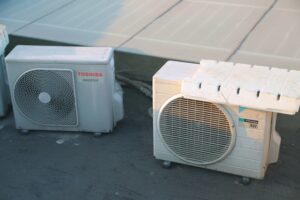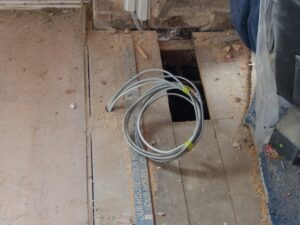If you’re a homeowner or business owner, you know that having a reliable heating system is essential for comfort and productivity. If your boiler is outdated or inefficient, it may be time for a replacement. At Excel Mechanical, we offer a range of boiler replacement options to fit your needs and budget. With our expertise in HVAC and plumbing services, we can help you choose the best system for your space.
One of the biggest benefits of a boiler replacement is increased energy efficiency. Newer models are designed to use less fuel and produce fewer emissions, which can save you money on your energy bills and reduce your carbon footprint.
Of course, cost is always a consideration when it comes to a boiler replacement. We understand that every customer has unique needs and budget constraints. That’s why we offer a range of options at different price points, so you can find the best fit for your situation. Our team of experts will work with you to assess your space and recommend the most cost-effective solution that meets your needs. With our commitment to exceptional quality and value, you can trust that you’re getting the best possible system for your investment.
Understanding Boiler Types
When it comes to boiler replacement options, there are three main types of boilers to choose from: conventional boilers, combination boilers, and system boilers.
Conventional Boilers
Conventional boilers, also known as traditional or regular boilers, are a popular choice for large homes with multiple bathrooms. They require a separate hot water cylinder and cold water tank, which takes up more space than other types of boilers. They are suitable for homes with low water pressure and those that use a lot of hot water at once. Conventional boilers are available in gas, electric, and oil options.
Combination Boilers
Combination boilers, also known as combi boilers, are a space-saving option that combines a water heater and central heating boiler into one unit. They are suitable for small to medium-sized homes with one or two bathrooms and low to medium water usage. Combi boilers are available in gas and electric options.
System Boilers
System boilers, also known as sealed system boilers, are similar to conventional boilers in that they require a separate hot water cylinder. However, they do not require a cold water tank, making them a space-saving option. They are suitable for homes with multiple bathrooms and high water usage. System boilers are available in gas, electric, and oil options.
Factors Influencing Boiler Replacement
When considering boiler replacement options, there are several factors that you need to take into account. Here are some of the key factors that can influence your decision-making process:
Home Size and Boiler Capacity
The size of your home and the capacity of your boiler are important factors to consider when replacing your boiler. If your boiler is too small for your home, it will struggle to keep up with your heating needs, which can lead to higher energy bills and a less comfortable living environment. On the other hand, if your boiler is too large for your home, it will be less efficient and waste energy.
Fuel Availability and Type
The type of fuel that your boiler uses is another important factor to consider. The most common types of fuel used for boilers are natural gas, oil, and propane. The availability of these fuels in your area and their prices can impact your decision.
Local Climate Considerations
The local climate is another important factor to consider when replacing your boiler. If you live in a colder climate, you may need a more powerful boiler to keep your home warm. We can help you choose the right boiler for your local climate and heating needs.
Cost Analysis of Boiler Replacement
Replacing a boiler can be a significant investment, but it can also provide long-term savings and efficiency. Here is a breakdown of the costs and potential savings associated with boiler replacement.
Initial Investment and Boiler Cost
The cost of a new boiler can vary depending on the type of boiler and the size of your home or business. According to our research, the cost of a new boiler can range from $2,200 to $10,000 for a standard-efficiency residential model. High-efficiency boiler replacement costs can range from $4,000 to $16,000. The installation cost can add an additional $2,000 to $5,000 to the total cost.
Long-Term Savings and Efficiency
While the initial investment for a new boiler can be significant, the long-term savings can be substantial. High-efficiency boilers can save you up to 30% on your heating bills compared to older, less efficient models. Additionally, a new boiler can increase the value of your home or business.
Potential Rebates and Incentives
There are potential rebates and incentives available for those who choose to replace their boiler with a high-efficiency model. These incentives can vary depending on your location and the type of boiler you choose. Some states offer rebates of up to $1,500 for high-efficiency boiler replacements.
Replacing your boiler can be a significant investment, but it can also provide long-term savings and efficiency.
Installation and Maintenance Considerations
When it comes to replacing your boiler, choosing the right installer is crucial. You want to ensure that the person or company you hire is qualified and experienced. Look for a professional who is registered with the Gas Safe Register, as this ensures that they have the necessary training and qualifications to work safely and legally on gas appliances.
In addition to choosing the right installer, regular maintenance and upkeep are important considerations for ensuring the longevity and efficiency of your boiler. This includes annual servicing and inspections, which can help prevent costly breakdowns and ensure that your boiler is operating safely and efficiently.
When it comes to installation costs and labor costs, these can vary depending on a number of factors, including the size and type of boiler, the complexity of the installation, and the location of your property. However, it’s important to keep in mind that investing in a high-quality boiler and professional installation can pay off in the long run, both in terms of energy savings and reduced maintenance costs.
Choosing the Right Installer
- Look for a professional who is registered with the Gas Safe Register
- Check for experience and qualifications
- Consider reputation and customer reviews
- Get multiple quotes and compare pricing and services
Regular Maintenance and Upkeep
- Schedule annual servicing and inspections
- Address any issues or concerns promptly
- Keep your boiler area clean and well-ventilated
- Consider upgrading to a more efficient model if your current boiler is outdated or inefficient
Environmental Impact and Regulations
When considering boiler replacement options, it is important to take into account the environmental impact of the new system and ensure compliance with local and federal laws. This section will cover the key aspects of environmental impact and regulations that you should consider.
Energy Efficiency and Carbon Footprint
One of the most important factors to consider when replacing a boiler is energy efficiency. High-efficiency boilers and condensing boilers are two options that can significantly reduce energy consumption and lower your carbon footprint. These boilers are designed to capture and reuse heat that would otherwise be lost in the combustion process, making them much more efficient than traditional boilers.
By choosing a high-efficiency or condensing boiler, you can not only reduce your energy bills but also minimize your impact on the environment.
Compliance with Local and Federal Laws
Replacing a boiler often requires permits and compliance with local and federal regulations. These regulations can vary depending on your location and climate zone, so it is important to work with a professional like Excel Mechanical who has experience navigating the regulatory landscape.
Get in touch to see what we can do for you.




